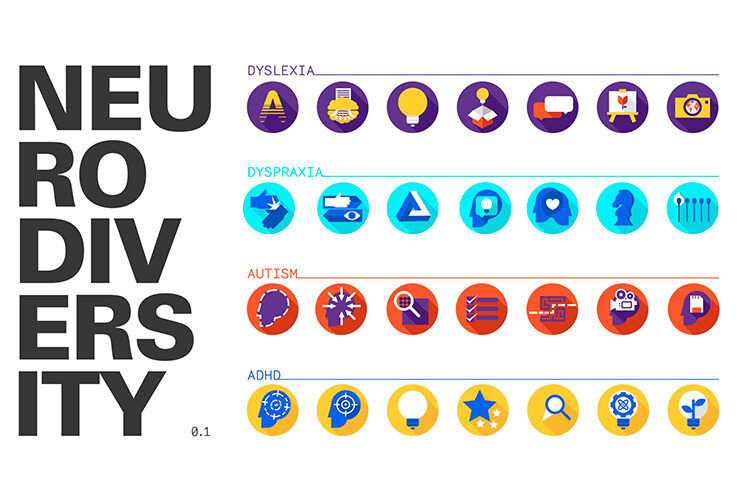In today’s society, we’re becoming increasingly aware of the value of diversity in all its forms. However, one area that often goes overlooked is neurodiversity. A term coined in the late 1990s, neurodiversity refers to the variety in the human brain and mind. It’s a concept that challenges us to shift our perspectives, encouraging us to view these differences not as disabilities, but as normal and positive variations in the human genome. This blog post aims to delve deeper into the concept of neurodiversity, highlighting the importance of neurodiversity inclusion, dispelling common myths, and providing tips on supporting neurodiverse individuals in daily life.
What is Neurodiversity?
Neurodiversity is a concept that recognizes and respects neurological differences just as we do any other human variation. These differences can include those labeled with Dyspraxia, Dyslexia, Attention Deficit Hyperactivity Disorder, Dyscalculia, Autistic Spectrum, Tourette Syndrome, and others. The neurodiversity inclusion approach views these differences as a natural part of human diversity, rather than flaws that need to be corrected.
Embracing Differences and Championing Inclusivity
The key to embracing differences is understanding and acceptance. We must learn to appreciate the unique perspectives and strengths that neurodiverse individuals bring to the table. A neurodiversity inclusion environment is one where everyone feels valued, included, and empowered to achieve their full potential. This means creating spaces in our communities, schools, and workplaces that are adaptable and flexible to different needs and learning styles.
Myths of Neurodiversity
Unfortunately, many myths surround neurodiversity, often based on misunderstanding or lack of knowledge. One such myth is that neurodiverse individuals cannot lead successful lives. However, many people who are neurodiverse have achieved incredible success in their fields, from artists and musicians to scientists and entrepreneurs.
In fact, neurodiversity can offer significant benefits, especially in the workplace. Different brains think differently, and this cognitive diversity can lead to increased creativity, innovation, and problem-solving abilities. The neurodiversity inclusion approach not only supports neurodiverse individuals but also enriches our society as a whole.
Another myth is that all neurodiverse people are all alike, that they share the same traits, strengths, and challenges. Just like neurotypical individuals, those who are neurodivergent are unique in their abilities and experiences. For example, some individuals with autism may have exceptional abilities in areas such as math or music, while others may excel in visual thinking or have remarkable memory skills.
Supporting Neurodiversity in Schools and the Workplace
Supporting neurodiverse individuals, whether they’re children or colleagues, begins with understanding their unique learning styles and building empathy. It’s about moving away from a one-size-fits-all approach and towards individualized strategies that help each person succeed.
For children, this might mean incorporating visual aids or hands-on activities into their learning. For colleagues, it could involve providing clear, written instructions for tasks, or offering quiet, distraction-free spaces to work. Above all, it’s crucial to foster an environment of understanding, patience, and empathy.
Neurodiversity Inclusion: The Way Forward
Embracing neurodiversity is not just about supporting neurodiverse individuals—it’s about enriching our society with diverse perspectives and skills. At The Ross Center, we are committed to supporting neurodiversity and championing inclusivity. We offer a variety of mental health services as well as a full range of testing and assessment services, including ADHD and Autism Spectrum Disorders.
In a recent discussion about the importance of neurodiversity and its impact on mental health, Ryan Landoll, a seasoned clinician at The Ross Center, shed light on their unique approach. He discussed their commitment to an inclusive, empowering process that acknowledges the fluid nature of neurodiversity across different life stages and environments. Landoll expressed the following:
Our testing program fully believes in the inclusive approach to neurodiversity. Our entire process – from initial consultation to providing feedback – is centered around empowering an individual to reach their full potential and using the best evidenced-based practices to help inform them how to do so.
We recognize that neurodiversity manifests differently not only for different individuals, but also across the lifespan. So we take a developmentally sensitive approach to testing, using different tools to understand the individual and their current environment, whether that is school, college, the workplace or anyplace else.
If you would like to schedule an appointment for therapy or testing for you or your child, we invite you to request an appointment with one of our mental health professionals. You can also subscribe to our newsletter for ongoing resources and support. Together, we can create a world that celebrates diversity in all its forms.

